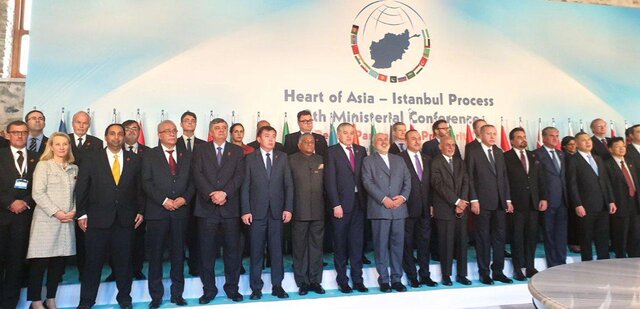Pirmohammad Mollazehi told the Strategic Council on Foreign Relations that there appears to be a determination among big powers such as Russia, China, the United States and Europe with the objective of finding a political solution for the termination of the war in Afghanistan.
“The domestic situation in Afghanistan requires the formation of such a process. Moreover, the countries of the region and Afghanistan’s neighbors have also reached the conclusion that more serious efforts are needed in this path,” he said, referring to numerous rounds of negotiations held for the establishment of peace in Afghanistan.
Mollazehi said Russians and Americans have proposed two initiatives to establish peace in Afghanistan, adding that “under such circumstances, there is going to be a meeting within the next few days in Istanbul with the participation of all parties. This meeting is in fact complementary to the Moscow meeting and it appears that there is some sort of agreement behind the scene between the Americans and Russians over the future of Afghanistan and the structure of power—a structure of power which is going to be different from the arrangements formed by the United Nations and the first Bonn Conference which led to the establishment of the present structure of governance.”
New structures of power in Afghanistan
This expert of Afghanistan issues said “it seems that there is going to be a merger among opposition forces, the Taliban and the incumbent government as well as forces who claim power in Afghanistan in the new structure of power so that power is shared and Afghanistan’s Constitution is reformed or amended to be adaptable to the new conditions.”
According to Mollazehi, the form of government may change from the present status which has centralized power in Kabul and in the hands of the president. A parliamentary system shall be established with the prime minister to hold the executive power. Also, there is some sort of the distribution of power in the form of federalism which incorporates at least four main ethnicities of Afghanistan in areas that are legally under their control. A share of local government will be set aside for the federal government.
He said that the implementation of such a structure of power and program and the establishment of peace and stability through this structure will not be simple, adding that in addition to the Taliban who are claiming power, there are about 23 other groups that have had no place in these negotiations. They can easily hoist the flag of Daesh and continue their conflict under the name of the Daesh khalifate.
Mollazehi added that “it seems that there has been agreements on several issues. For example, they want Afghanistan to be non-partisan. In fact, a form of government which existed during Zaher Shah based on which no eastern and western powers shall interfere. This system of course was disrupted after a coup by Davood Khan. The conditions created after the victory of jihad and defeat of Russians which led to the emergence of the Mojahedin will not repeat under which Americans and Russians withdrew but countries of the region entered competition.”
Efforts to the impartiality of Afghanistan
This expert of Afghanistan affairs said an agreement should be hence concluded which is recognized by big powers and regional powers and neighbors as being impartial.
“If this happens, Afghanistan will be placed in a new status so that it could maintain its impartiality and if Afghanistan is to receive assistance from abroad, it should be unconditional and without foreign intervention.”
Referring to issues to be discussed in the Istanbul meeting, he said it seems that Afghanistan would move towards peace and stability and political solution if the dimensions of the new situation are well discussed and clarified in the Istanbul meeting. Otherwise, civil war may be intensified in Afghanistan after the Istanbul meeting.
On the criticisms leveled by the government of Ashraf Ghani concerning the probability of exerting power in changes in the structure of power and government, he said there are two branches of approaches in the government.
“In a branch which is known as the national unity government, there are Jihadis and the Northis represented by Mr. Abdollah Abdollah and the other branch is the Liberal Democrats who are represented by Mr. Ghani. The combination of these two currents would form the present government. It seems that the Northis and the Abdollah Abdollah section are prepared to reconcile with the Taliban.”
The probability of omission of Ashraf Ghani and his close allies from power
Mollazehi said Ashraf Ghani and his close allies will be sacrificed and probably omitted. However, the Liberal Democrat current will not be omitted. They are the third current that would remain next to the Jihadis, Abdollah and the Taliban. Therefore, the combination of these three currents would be probably taking the power in Afghanistan of course without the presence of Ashraf Ghani who may step aside.
This expert of Afghanistan issues said Ashraf Ghani is very political and would not step aside easily, adding that “Ghani will play his role as he brings a plan to Istanbul based on which early elections should be held within the next six months and the winner will hold the power and the process will be recognized and continue through democratic mechanisms described in the present Constitution of Afghanistan.
He said Ghani has presented this plan in order to maintain his grip on power.
“Within the framework of the present Constitution of Afghanistan, the Taliban would not easily accept this plan; therefore, each one of these players, either domestically or regionally and internationally, would be pursuing their own agenda in Istanbul however it seems that Mr. Abdollah Abdollah and the Taliban will not back down and Ashraf Ghani would therefore have no choice but the withdraw his plan.”










0 Comments